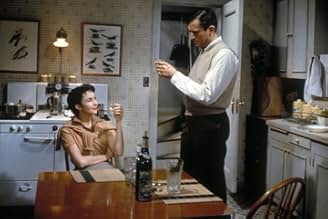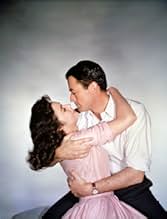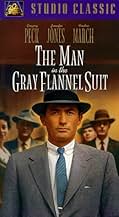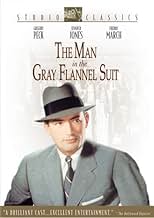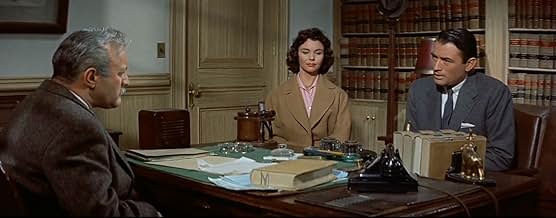NOTE IMDb
7,1/10
4,4 k
MA NOTE
Ajouter une intrigue dans votre langueAn ex-soldier faces ethical questions as he tries to earn enough to support his wife and children well.An ex-soldier faces ethical questions as he tries to earn enough to support his wife and children well.An ex-soldier faces ethical questions as he tries to earn enough to support his wife and children well.
- Réalisation
- Scénario
- Casting principal
- Récompenses
- 1 victoire et 3 nominations au total
Tristram Coffin
- Byron Holgate
- (scènes coupées)
William 'Bill' Phillips
- Antonio Bulaga
- (scènes coupées)
Avis à la une
I was pleased to get a chance to see this movie -- at least half of it -- during a bout of insomnia. The title was a catchphrase for corporate America for many, many years, a kind of symbol for overachieving, aggressive, ambitious businessmen without principles -- in other words, the "suits."
Though I am generally wary of Gregory Peck's (and Jennifer Jones') tendency to niceness, I was impressed by their work here. Their relationship was both substantial and subtle. Jennifer Jones had much much more humanity and integrity than the average housewife portrayed in other films of the 50s and 60s. Peck's character respected her opinions and values.
But I was knocked out by Fredric March. His type A, workaholic executive was touching on many levels. His utter tiredness, alcoholic puffiness, and innate sadness was plastered over with a Willy Loman-like veneer of gung-ho, jolly-good-fellow false heartiness. How familiar that character was and is -- in real life. His ambition, greed and drive had become a habit, and like any junky, he was simply unable to quit. Despite the human losses. I will never forget the scene in his office, when his wife calls him up, and he slowly hangs up the phone.
A very fine film, with many truths about our national character and obsessions....
Though I am generally wary of Gregory Peck's (and Jennifer Jones') tendency to niceness, I was impressed by their work here. Their relationship was both substantial and subtle. Jennifer Jones had much much more humanity and integrity than the average housewife portrayed in other films of the 50s and 60s. Peck's character respected her opinions and values.
But I was knocked out by Fredric March. His type A, workaholic executive was touching on many levels. His utter tiredness, alcoholic puffiness, and innate sadness was plastered over with a Willy Loman-like veneer of gung-ho, jolly-good-fellow false heartiness. How familiar that character was and is -- in real life. His ambition, greed and drive had become a habit, and like any junky, he was simply unable to quit. Despite the human losses. I will never forget the scene in his office, when his wife calls him up, and he slowly hangs up the phone.
A very fine film, with many truths about our national character and obsessions....
A man, feeling pressure from his wife for a better lifestyle, takes a new job with increased pay but added stress. To make matters worse, he becomes embroiled in legal actions concerning an inheritance from his grandmother. On top of all this, he learns that some of his actions in Italy during World War 2 have come to haunt him. This is a well told story with many sides to it, and I feel the use of flashback went a long way in making it even better. Well worth seeing.
In Connecticut, the former WWII officer Tom Rath (Gregory Peck) and his wife Betsy (Jennifer Jones) are happily married middle class couple with three children. However, they have financial difficulties and Tom commutes every day to Manhattan to work in a charitable organization receiving a low salary.
Tom is tormented by the traumatic experience in war, where he killed seventeen persons including a young German soldier and he occasionally recalls his love affair with the Italian Maria (Marisa Pavan) in 1945.
When Tom inherits his grandmother's house, her former servant claims the real state but using forged document. Meanwhile Tom is hired to work as public relation of a television network and is assigned to write a speech to the owner, Ralph Hopkins (Frederic March). Soon he needs to decide whether he will be a dedicated executive or 9 to 5 fellows. Further, he learns that he has a son with Maria and she is very needy and he needs to choose between telling the truth to Betsy or keep the secret.
"The Man in the Gray Flannel Suit" is a realistic and humanistic drama about choices of an insecure man with a war trauma that frequently haunts him. Tom Rath sometimes is reluctant, thinking in the safety of his family first, but always takes the right decision supported by his beloved wife Betsy. The story has many subplots and one memorable character, Judge Bernstein, performed by Lee J. Cobb. The story is long but never boring. My vote is seven.
Title (Brazil): "Homem do Terno Cinzento" ("Man in the Gray Suit")
Tom is tormented by the traumatic experience in war, where he killed seventeen persons including a young German soldier and he occasionally recalls his love affair with the Italian Maria (Marisa Pavan) in 1945.
When Tom inherits his grandmother's house, her former servant claims the real state but using forged document. Meanwhile Tom is hired to work as public relation of a television network and is assigned to write a speech to the owner, Ralph Hopkins (Frederic March). Soon he needs to decide whether he will be a dedicated executive or 9 to 5 fellows. Further, he learns that he has a son with Maria and she is very needy and he needs to choose between telling the truth to Betsy or keep the secret.
"The Man in the Gray Flannel Suit" is a realistic and humanistic drama about choices of an insecure man with a war trauma that frequently haunts him. Tom Rath sometimes is reluctant, thinking in the safety of his family first, but always takes the right decision supported by his beloved wife Betsy. The story has many subplots and one memorable character, Judge Bernstein, performed by Lee J. Cobb. The story is long but never boring. My vote is seven.
Title (Brazil): "Homem do Terno Cinzento" ("Man in the Gray Suit")
Ten years after Gregory Peck and Jennifer Jones lit up the screen with their torrid love-hate relationship in "Duel in the Sun," they were reunited in this engrossing business-domestic drama.
The two were surrounded by a great cast, headed by Fredric March and Lee J. Cobb, to offer a sincere portrait of a junior Madison Avenue exec who must choose between being a "big CEO" or a "second-tier nine-to-fiver".
Director/screenwriter Nunnaly Johnson guided the actors in uniformly well-modulated performances, all deeply felt and cleanly expressed. Keenan Wynn offered a surprisingly subtle and touching performance as well, in a film produced by Darryl F. Zanuck, with a Bernard Herrmann score.
What a treat it is to watch these fine thespians breathe life into most intriguing characters from Sloan Wilson's thoughtful novel.
The two were surrounded by a great cast, headed by Fredric March and Lee J. Cobb, to offer a sincere portrait of a junior Madison Avenue exec who must choose between being a "big CEO" or a "second-tier nine-to-fiver".
Director/screenwriter Nunnaly Johnson guided the actors in uniformly well-modulated performances, all deeply felt and cleanly expressed. Keenan Wynn offered a surprisingly subtle and touching performance as well, in a film produced by Darryl F. Zanuck, with a Bernard Herrmann score.
What a treat it is to watch these fine thespians breathe life into most intriguing characters from Sloan Wilson's thoughtful novel.
This movie from the 1950's goes beyond the conflict in balancing home and work commitments because it also deals with the loss of idealism by young people who become caught up with the need to provide and the competition to succeed. Life seems to have gotten worse in the 60 years since this movie was made. In fact, some people, both men and women, have given up on the idea of family life in favour of success in the business world. One can only guess at the level of social dysfunction from our addictive and artificial work environments. In this movie, directed by Nunnally Johnson, a cast of exceptional acting talent provides great entertainment as well as an insight into the shallow lives that many people began to lead in the 1950's. Jennifer Jones signals her dissatisfaction with her husband's work ethic. This at first struck me as a yearning for a lost youth, wanting her husband Gregory Peck to provide for his family while keeping his knight in shining armour image. But Jones is no status seeker; she senses the boring conventional work world that her husband inhabits is not healthy for him or the family. Fredric March, that icon of American integrity, is the company Chairman. On the surface, he pays lip service to family values but struggles with his own estrangement from his wife and a daughter's elopement. Peck learns from March as a mentor but also in his failings as a man. Lee J. Cobb has a supporting role as judge and family friend. Towards the end of the movie, after some setbacks, Peck and Jones take a courageous step together that shows their own integrity and their maturity as a couple. The movie is a another landmark for the World War II generation who came back to civilian life and encountered a new world. It is one worth watching!
Le saviez-vous
- AnecdotesOne of Gregory Peck's movie children was played by Portland Mason, who was the daughter of actor James Mason, and an Italian delivery boy was played by Johnny Crawford a few years before he would achieve fame on the popular TV Western, L'homme à la carabine (1958).
- GaffesIt is believed by some that Tom shifting his car into reverse then driving away forward at the end of the film is a goof. However, the car is a manual transmission Ford with a column-shifted 3 speed manual transmission with an unsynchronized first gear. A quirk of that style transmission is that at a standing stop, getting the transmission into 1st gear when the engine is running is easiest if the operator first abruptly lifts the shift lever from neutral to place the transmission into second gear, then back down into first. This prevents clash (grinding) of the unsynchronized first gear. Drivers of the era, including Tom Rath, would have been well familiar with this technique.
- Citations
Tom Rath: I don't know anything about public relations.
Bill Hawthorne: Who does? You've got a clean shirt and you bathe every day. That's all there is to it.
- Crédits fousOnce it fades in, the 20th Century Fox logo (set to the film's dramatic opening credits music, rather than the traditional Fox fanfare) appears in a slightly smaller CinemaScope windowbox, slowly panning to normal size (correctly fitting the CinemaScope screen) before fadeout.
- ConnexionsFeatured in The Fifties (1997)
- Bandes originales(I'm a) Ramblin' Wreck from Georgia Tech
(1908) (uncredited)
Lyrics by Billy Walthall
Music by Frank Roman and Mike Greenblatt
based on "Son of a Gambolier"
Music by Charles Ives (1895)
Played on the ukulele by Gregory Peck
Meilleurs choix
Connectez-vous pour évaluer et suivre la liste de favoris afin de recevoir des recommandations personnalisées
- How long is The Man in the Gray Flannel Suit?Alimenté par Alexa
Détails
- Date de sortie
- Pays d’origine
- Site officiel
- Langues
- Aussi connu sous le nom de
- The Man in the Gray Flannel Suit
- Lieux de tournage
- Société de production
- Voir plus de crédits d'entreprise sur IMDbPro
Box-office
- Budget
- 2 670 000 $US (estimé)
- Durée
- 2h 33min(153 min)
- Couleur
- Rapport de forme
- 2.55 : 1
Contribuer à cette page
Suggérer une modification ou ajouter du contenu manquant


